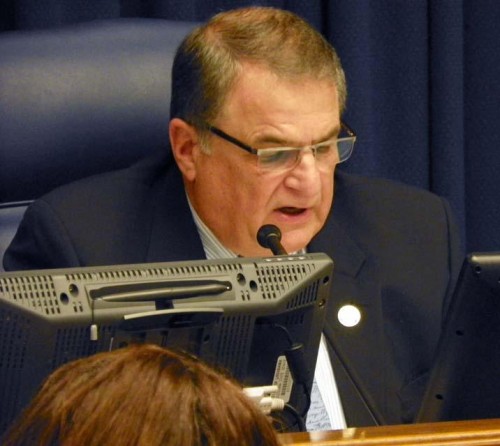Tuesday, May 10
May 10, 2011Thursday, May 12
May 12, 2011Some would call it bureau-speak but to those sitting through Monday’s Senate Retirement Committee hearings on the privatization of the Office of Group Benefits, it was more like gooney-babble.
Commissioner of Administration Paul Rainwater, just as he did last week, tried to convince legislators of the wisdom of privatizing the agency that has amassed a $500 million surplus and which has an administrative cost of only 3.5 percent.
As if that were not enough, Legislative Auditor Daryl G. Purpera testified that Rainwater has refused to provide documents that his office is constitutionally entitled to have in order to conduct proper assessments. “We requested certain documents, particularly those pertaining to the Chaffe contract we were told by Mr. Rainwater that those documents would not be provided,” Purpera said.
“We also tried to get specifics of the proposal but I received a letter from Mr. Rainwater saying those would not be provided under exceptions. My office cannot do its job if we have scope limitations,” he said.
The proposal to which he alluded was the proposal submitted by Goldman Sachs to conduct a financial assessment of OGB and to market the agency for a buyer, according to the RFP. The Chaffe contract was a $49,999.99 contract with Chaffe and Associates of New Orleans to conduct an interim assessment. The contract amount was one cent less than the amount that would have required concurrence by the Office of Contractual Review.
Rainwater started his testimony by comparing Louisiana to other states, zeroing in on the staff sizes of the other states as compared to OGB’s 300 employees.
At times appearing to talk down to committee members and once even admonishing committee Chairman Sen. D.A. “Butch” Gautreaux (D-Morgan City) to not interrupt while he was speaking, Rainwater said the $500 million surplus “is not for sale. It will not be diverted for any other use other than to pay claims.”
What he did not say on Monday but did say a week ago was that while the surplus would indeed be used to pay claims, it would no longer be OGB surplus funds paying the claims because the surplus would go over to the buyer who would use the fund to pay claims.
It was only a couple of weeks ago that Rainwater said the OGB $500 million reserves are an attractive selling point because the private company that ultimately purchases the agency would not have to dip into its own capital to pay claims.
Last week, however, a casual observer would have had difficulty believing Rainwater was talking about the same proposal.
“At the end of the day,” he told the committee, “we will still have the Office of Group Benefits with 149 employees.”
“I’m not getting answers to my questions here,” Gautreaux said.
“You are getting answers,” Rainwater shot back.
Gautreaux said if the agency is privatized, “There will have to be rate increases and/or benefit reductions. There’s no way to avoid that with a private company trying to turn a profit.”
Division of Administration (DOA) Chief of Staff Kirk Thibodeaux said Gautreaux was incorrect. “The Legislature will have to approve any contract” for a third party administrator, he said, so lawmakers would have the opportunity to examine the rate structure.
Rainwater said there would be a five-year contract with a third party administrator. “At the end of the five years, we’ll take a look at it.”
“What’s going on here?” Gautreaux demanded. “Last week we were talking about selling OGB and now we’re talking about a contract with a third party administrator. You three (Rainwater, Thibodeaux, and OGB newly-appointed CEO Scott Kipper) may know what you’re talking about but the rest of us surely don’t.”
Rep. Hollis Downs (R-Ruston), sitting in as a guest for the second week in a row, said, “The state’s HMO is self-insured but administered by a third party, in this case, Blue Cross/Blue Shield, am I correct?”
“That’s correct,” Rainwater said.
“The state’s PPO (Preferred Provider Organization) is now self-insured and self-administered with the state paying all claims but you’re proposing that it become self-insured but administered by a third party?”
“Yes, sir.”
“And my understanding is you may combine both the HMO and PPO into one, am I correct again?”
“Yes, we could conceivably bundle the two for greater efficiency.”
“So, you’re just selling a block of business and the state would continue to have oversight?” Downs asked.
“That’s correct,” Rainwater said.
Following Rainwater’s departure from the committee room, Travis McIlwain, director of the General Government Section of the Legislative Fiscal Office spoke briefly on efforts to analyze the administration’s proposal.
“Frankly, we have nothing in hand that would allow us to analyze this proposal,” he said. “Until today, we have heard only that the administration wants to sell OGB and now, Mr. Rainwater says it’s not for sale but is for lease to a third party administrator. I’m as confused as you, Mr. Chairman,” he said to Gautreaux.
State Sen. D.A. “Butch” Gautreaux (D-Morgan City) questions Commissioner of Administration Paul Rainwater about a recommendation to privatize the state’s Office of Group Benefits. TOM ASWELL









